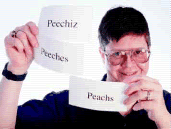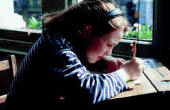


|

|

Dr. Connie Varnhagen |
Vice President Dan Quayle may never live down that fateful spelling bee. While a guest judge at an elementary school competition, he suggested a student change the correct spelling of "potato" to "potatoe." And in the media blitz that followed, Quayle was ridiculed over and over-in television and newspaper stories, even in a Web site dedicated to "Dan Quayle's Problems With Spelling." In the annals of U.S. history, it seems Dan Quayle will be remembered more for his poor spelling than for his political platform.
"If you don't spell right," says Dr. Connie Varnhagen, associate professor of psychology, "You can't communicate. Poor spellers get this bad rap that they're dumb. [It's true that] people with intellectual disabilities have poor spelling but that doesn't mean poor spellers necessarily have an intellectual disability."
However, poor spelling can leave that impression. Barbara Williams, human resources employment officer, says misspelled words in letters or résumés can jeopardize an applicant's chances for a job. "I can't resist the urge to circle the mistake, which I always do. I have a negative impression of that candidate. I think it says they're careless."
It could be just carelessness, says Varnhagen, or it could say a lot more about the writer. A developmental psychologist and self-confessed 'miserable speller,' she has a personal and professional interest in the mechanics of spelling. "Spelling is a wonderful mirror on children's cognitive development."

|
Cognitive development, she says, refers to how thought processes change over time. In studies of elementary school children's spelling, Varnhagen and her lab group, including Dorothy Steffler, Patricia Boechler, Chris Friesen, Dean Taylor, Geniva Liu, and Jane Tram, observed how children go "from not knowing anything to knowing a lot. Some of the issues we are looking at is how do they develop automaticity-where it comes without thinking about it-and in spelling how do they go from the slow effortful sounding out of words kkkkkk-aaaaa-ttttt-to just spelling 'cat'."
They do it, research shows, by developing multiple strategies to problem solving.
During a study conducted by Varnhagen and Boechler, children between Grades 1 through 6 were shown three cards with different spellings of the same word, for example: peachs, peeches, peechiz. By asking the children "which word looks right?" the researcher can determine what information children are using to spell different types of words.
Research conducted by Varnhagen and her students has implications for teachers: it's not enough to just administer spelling tests. "That only tells you whether they can spell the word right or wrong," Varnhagen says, "It doesn't tell you anything about what strategies they are using when they are spelling." Teachers, then, should ask students how they spell words, rather than draw inferences from spelling errors. The children's strategies, Varnhagen says, provide valuable insight into their thought processes. For example, a child who spells "cake" as "cak" may have been taught the silent e rule, but not that it applies to long vowels. In this case, the child thinks the "a" says its own name, so there's no need for the "e" on the end.
Varnhagen says the goal of this research is to advance theories of cognitive development and to create more appropriate educational materials for children. Ultimately, she believes that helping children to use multiple problem-solving strategies will prepare them for all of life's challenges.
"Knowing to double a letter isn't going to help you tie your shoes, but knowing the strategic approach to tying your shoes is important," she says. "The notion of a strategy seems to be important for all cognitive development, for all of problem solving, for all of cognitive behavior. And multiple strategies are better than one strategy. That should generalize throughout education and life."
![[Folio]](http://www.ualberta.ca/~publicas/folio/gif/small/folio.gif)
Folio front page |
![[Office of Public Affairs]](http://www.ualberta.ca/~publicas/gif/small/opahome.gif)
Office of Public Affairs |
![[University of Alberta]](http://www.ualberta.ca/~publicas/gif/small/uahome.gif)
University of Alberta |